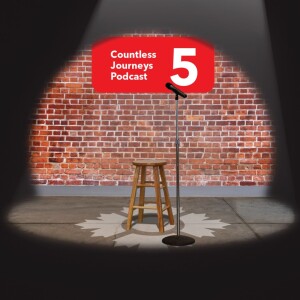
Growing up in Vancouver as the child of immigrants from China and Hong Kong, journalist Ann Hui had a very specific idea of what so-called authentic Chinese food was. “We would go eat in Chinatown. We would have wonton noodles, we would have dim sum, you know, really elaborate banquets. There were so many different ways of eating Chinese food, in my understanding of that kind of cuisine,” Ann tells host Tina Pittaway in the season premiere of season four of Countless Journeys.
But on the occasions that Ann got outside of the urban setting of Vancouver, she was fascinated by the small town Chinese restaurants that are common across the country. “There would always be that one restaurant on the main street. It was always called Fortune something or Garden or Panda or Jade, something.”
Similar in décor, and with menu items that were a mystery to Ann – things like moo goo gai pan, chicken balls, and almond chicken, dishes that were created for local tastes – she wanted to learn why, in pre-internet days, so many of these restaurants were so similar to one another.
So when Ann was hired as a food writer for the Globe and Mail back in 2016, she set out on a road trip that took her from Victoria to Fogo Island in search of answers.
Her series eventually became the subject of her book, Chop Suey Nation: The Legion Café and Other Stories from Canada’s Chinese Restaurants. Part personal memoir, and part cultural history, Ann shares not only the stories of the people who own these businesses, but also the stories of the historical forces that in part led to these Chinese restaurants' creation, including an infamous piece of legislation, commonly referred to as the Chinese Exclusion Act, which became law 100 years ago in 1923.
Countless Journeys is brought to you by the Canadian Museum of Immigration at Pier 21, located at the Halifax Seaport.
view more
More Episodes
Community Builders
 2021-07-19
2021-07-19
 2021-07-19
2021-07-19
Legends part 2 Sonja Bata
 2021-07-05
2021-07-05
 2021-07-05
2021-07-05
Legends part 1 Wally Buono
 2021-06-20
2021-06-20
 2021-06-20
2021-06-20
Generation 1.5
 2021-06-06
2021-06-06
 2021-06-06
2021-06-06
Tastemakers
 2021-05-24
2021-05-24
 2021-05-24
2021-05-24
Season 2 Trailer
 2021-05-21
2021-05-21
 2021-05-21
2021-05-21
Canadian Dreams
 2020-07-10
2020-07-10
 2020-07-10
2020-07-10
Working Life
 2020-06-11
2020-06-11
 2020-06-11
2020-06-11
Love & Family
 2020-05-25
2020-05-25
 2020-05-25
2020-05-25
War & Persecution
 2020-05-25
2020-05-25
 2020-05-25
2020-05-25
Season 1 meet the host: Mark Sakamoto
 2020-05-22
2020-05-22
 2020-05-22
2020-05-22
012345678910
Create your
podcast in
minutes
- Full-featured podcast site
- Unlimited storage and bandwidth
- Comprehensive podcast stats
- Distribute to Apple Podcasts, Spotify, and more
- Make money with your podcast
It is Free
- Privacy Policy
- Cookie Policy
- Terms of Use
- Consent Preferences
- Copyright © 2015-2024 Podbean.com






